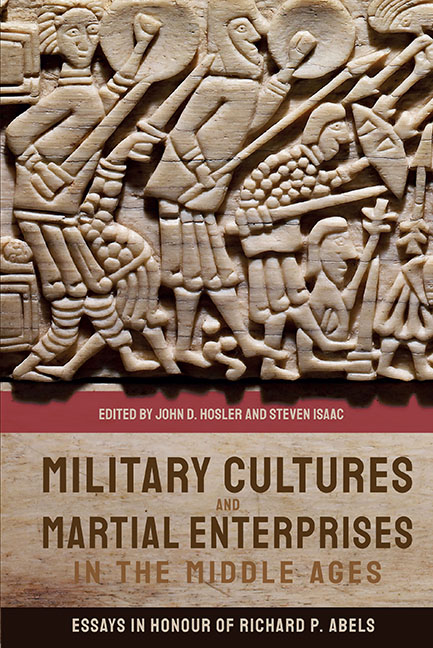Book contents
- Frontmatter
- Contents
- List of Illustrations
- Notes on Contributors
- Introduction and Appreciation
- 1 Charlemagne’s Invasion of Spain in 778: The Anatomy of a Strategic Failure and its Impact
- 2 Military Intelligence and Strategic Planning Under the Ottonian Kings of Germany, 919–1024
- 3 Ain’t Nobody Here But Us Chickens: Defeated Warriors, Masculinity, and Mistaken Identity in Western Europe, 679–1141
- 4 Count Baldwin V of Flanders: Broker of Eleventh-Century Power
- 5 Kings and Fortuna: The Meanings of Brémule
- 6 Fighting the Last War: Remembering the Norman Conquest during the Anarchy
- 7 Gilbert of Mons’ Chronicle of Hainaut as a Source for Military History in the Twelfth Century
- 8 At Home with Roger of Howden
- 9 Embedded Reporters? Ambroise, Richard de Templo, and Roger of Howden on the Third Crusade
- 10 The Treatment of Male and Female Prisoners of War during the Third Crusade
- 11 Exempla, Crusade, and Chivalry
- 12 Frontier Warfare in the St Omer Chronicle
- 13 Some Observations on the Training of Medieval Warhorses
- Richard P. Abels’ Curriculum Vitae
- Index
- Tabula Gratulatoria
2 - Military Intelligence and Strategic Planning Under the Ottonian Kings of Germany, 919–1024
Published online by Cambridge University Press: 21 October 2020
- Frontmatter
- Contents
- List of Illustrations
- Notes on Contributors
- Introduction and Appreciation
- 1 Charlemagne’s Invasion of Spain in 778: The Anatomy of a Strategic Failure and its Impact
- 2 Military Intelligence and Strategic Planning Under the Ottonian Kings of Germany, 919–1024
- 3 Ain’t Nobody Here But Us Chickens: Defeated Warriors, Masculinity, and Mistaken Identity in Western Europe, 679–1141
- 4 Count Baldwin V of Flanders: Broker of Eleventh-Century Power
- 5 Kings and Fortuna: The Meanings of Brémule
- 6 Fighting the Last War: Remembering the Norman Conquest during the Anarchy
- 7 Gilbert of Mons’ Chronicle of Hainaut as a Source for Military History in the Twelfth Century
- 8 At Home with Roger of Howden
- 9 Embedded Reporters? Ambroise, Richard de Templo, and Roger of Howden on the Third Crusade
- 10 The Treatment of Male and Female Prisoners of War during the Third Crusade
- 11 Exempla, Crusade, and Chivalry
- 12 Frontier Warfare in the St Omer Chronicle
- 13 Some Observations on the Training of Medieval Warhorses
- Richard P. Abels’ Curriculum Vitae
- Index
- Tabula Gratulatoria
Summary
THANKS IN LARGE PART to the work of Richard Abels (especially his detailed treatment of the strategic planning efforts of the Anglo-Saxon King Alfred the Great), the longstanding view that pre-crusade Europe lacked anything resembling military science has been untenable for some time. However, one area of medieval military activity that was of exceptional importance for strategic and tactical planning has received very little attention, particularly in pre-crusade Europe. This is the broad matrix of activities subsumed under the rubric of military intelligence and planning. The following essay focuses on the role of both military intelligence and long-term planning in the conduct of war under the Ottonian rulers of Germany in the period 919–1024.
The boundaries between the intelligence and planning that are required over the short, medium, and long term were then, and as they are now, quite fluid. For heuristic purposes, however, it is useful to divide the overall problem of military intelligence and planning into three elements, namely the development and utilization of militarily important information at the levels of battlefield tactics, the organization of campaigns, and finally, longterm strategy. In pursuing questions related to these three overlapping aspects of military intelligence and planning, I draw upon written sources of information, primarily narrative texts and royal charters, and also the wealth of archaeological material developed over the past century.
Battlefield Intelligence
A longstanding bias in studies of warfare holds that early medieval rulers and military commanders lacked even rudimentary skills in what today is understood broadly as military science. Indeed, some historians have claimed that even such obvious measures as deploying scouts were beyond the capacity of early medieval military commanders. As a consequence of these a priori assumptions, the actual efforts to gain tactical and battlefield military intelligence in the pre-crusade period has received very little scholarly attention, despite the fact that our sources provide considerable information about these topics. Indeed, in contrast to the often pessimistic depiction of military science in early medieval Europe, the Ottonian kings of Germany, their military commanders, and their adversaries devoted considerable effort and attention to obtaining tactically useful information that allowed them to shape the battlefield, protect themselves against surprises, and gain the element of surprise over their adversaries.
- Type
- Chapter
- Information
- Military Cultures and Martial Enterprises in the Middle AgesEssays in Honour of Richard P. Abels, pp. 41 - 60Publisher: Boydell & BrewerPrint publication year: 2020



